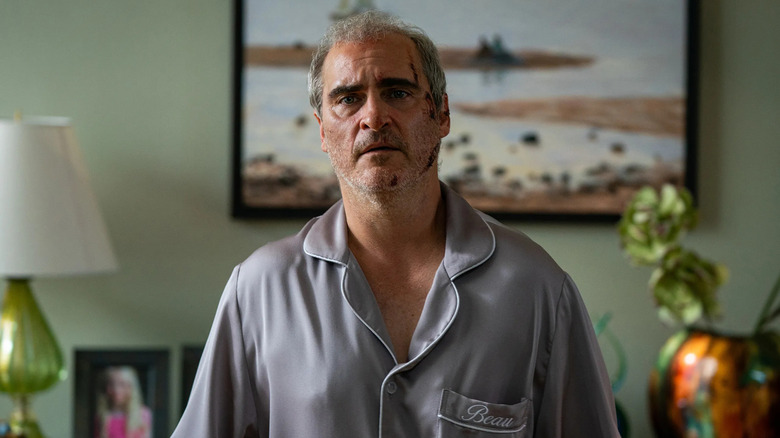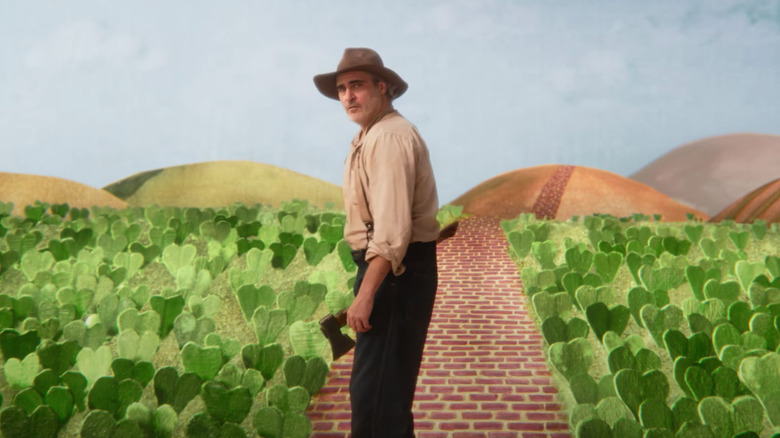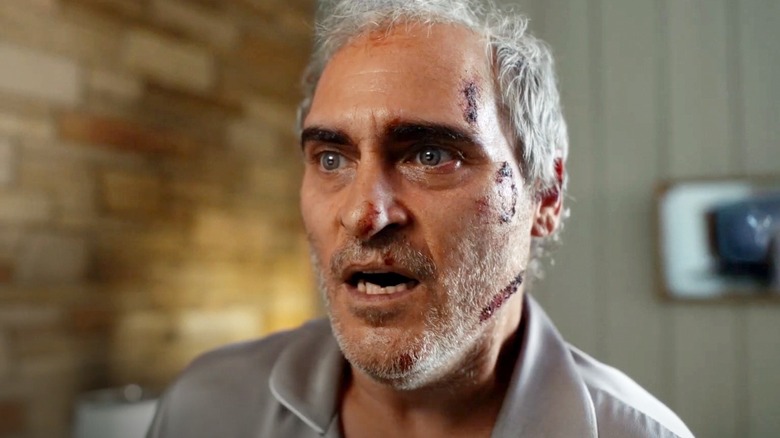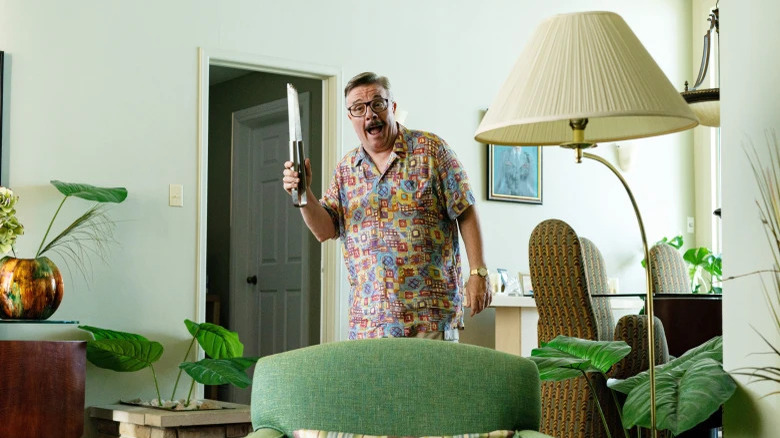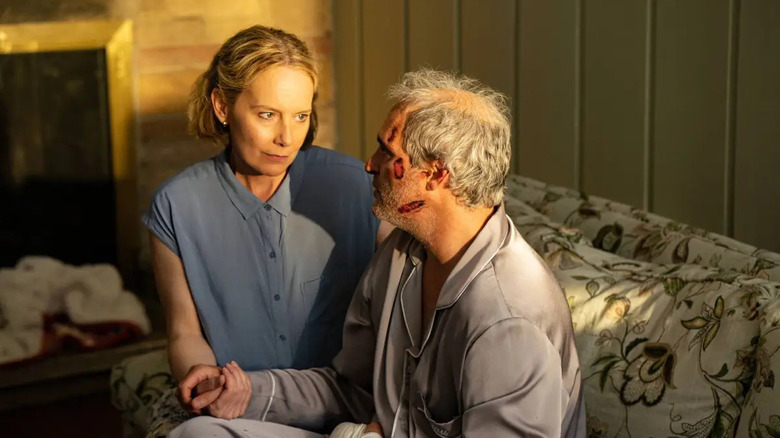Beau Is Afraid Ending Explained: Strangled By Apron Strings
The thesis for Ari Aster's tragicomic nightmare "Beau Is Afraid" is stated pretty plainly up front. Beau (Joaquin Phoenix) visits his therapist (Stephen McKinley Henderson) to talk about his anxieties, particularly how they stem from his mother. The unnamed therapist asks point blank: "Do you ever wish she was dead?" Beau shifts uncomfortably. He is prescribed a mysterious medicine and sent on his way. On the way back to his apartment, the audience sees the hell that Beau lives in. There are dead bodies in the street that no one has bothered to move in weeks. There are violent fights and fatal stabbings in broad daylight. Beau has to run through the chaos at top speed to avoid being apprehended by a black-eyed tattoo punk who clearly wants to do him harm. Once safely locked inside his vandalized, decrepit building, Beau can finally rest inside his squalid hole of misery.
Does Beau live in a dark near-future time when crime is rampant and the world is decaying? Is this a story of the post-apocalypse? In addition to the general insanity, it seems that an insidious pharmaceutical company, one that makes anti-psychotics, is a powerful commercial presence in most people's lives. Throughout the film, characters are seen popping pills, getting injections, and using chemicals to alter their brain chemistry. Little of it works. Every citizen is mad. It won't be until a little later that audience will learn the pharmaceutical company is, in fact, owned by Mona Wasserman (Patti LuPone), Beau's mother.
The fever pitch, however, indicates that little of what the audience is seeing is real in a conventional sense. The mad world of "Beau Is Afraid" may merely be how Beau sees it. It's all entropy — Beau is afraid, and his mother is orchestrating it all.
A boy's best friend is his mother
Aster's Oedipal freakout is clear from the start. Beau is afraid of his mother. Over the course of the film's three hours, Beau's mother, time and time again, dictates his anxiety, sometimes directly. Mona is an evil presence, who goes out of her way to make Beau guilty, to hurt him, to deliberately psychologically damage him. We see in flashbacks, where Mona is played by Zoe Lister-Jones and Beau is played by Armen Nahapetian, how unhealthy their relationship is. Mona tells Beau that his father died the instant Beau was conceived. Ever since, Beau has had a crippling fear of sex, thinking that he, too, will die if he ever has an orgasm.
The middle section of "Beau Is Afraid" is a classic nightmare. Thanks to a falling chandelier, Mona has died. Beau is tasked with returning home for the funeral by an angry lawyer played by Richard Kind. If Beau doesn't arrive in the next 48 hours, he'll miss the funeral and henceforth be dubbed the worst son ever. He can't leave town, however, because the horrible, rotting landscape has left him injured and in the care of strangely placid suburbanites played by Amy Ryan and Nathan Lane. No one can give him money for a plane ticket and no one can give him a ride. The suburbanites turn on him, and Beau flees into the woods. With each passing second, the guilt increases.
Beau's only respite is essentially fantasy. There is a dreamlike sequence in the wood where Beau watches an improvised theater rendition of his own life. Even in fantasy, Beau wishes he was merely a lost old man and a father ... but one who never had sex.
Sex = death
Aster never moves out of Beau's brain. "Afraid" plays itself out more like a therapy session than a conventional drama. The world is a dark and twisted place because Beau's mind is a dark and absurd place. Mona is the tyrant he'll never escape. By the end of the film, all of Beau's fantasies/fears are actualized in the "real" world, and his guilt is proven to be wholly justified.
Beau does eventually make it to the funeral ... a few hours too late. The audience learns that he grew up in extreme wealth, but was constantly forbidden to have friends, or to stop thinking about his mother for a second. Anyone who has ever been in a controlling relationship will likely recognize the dynamic. It's curious that "Beau Is Afraid" should be in theaters at the same time as Chris McKay's "Renfield," a comedic riff on "Dracula" that is also explicitly about a controlling relationship. It seems that there is something leaking through the pop consciousness in 2023.
After the funeral, Beau is reunited with Elaine (Parker Posey), the one woman in his life who once offered him something approaching a real romantic relationship. In a moment of catharsis, the two decide to go to bed, happy to be reunited, both happy to connect in a world of adult weariness. Beau is astonished to learn that having sex did not kill him.
It does, however, kill Elaine. When she climaxes, she dies. It's here that "Beau is Afraid" reveals itself, and also when it spins into a surreal phantasmagoria of Freudian symbolism.
Your real father
Mona appears in the doorway. She faked her death. She faked her death so she could test Beau's loyalty. She was confident he would fail. She gives him no credit for his struggles and has no empathy. She has been on a lifelong quest to prove that Beau hates her. Indeed, she has been in league with the therapist at the beginning. The therapist grins as he sadistically plays back audio of their therapy sessions. It should be obvious now, but Beau has no safe head space that Mona cannot infiltrate. This is very much the way it feels when one is controlled. The tyrant, it seems, can look into your mind and find your infractions.
The final 20 minutes of "Beau Is Afraid" is an extended "worst fears realized" segment. Beau begins yelling back, but it's too little, too late. He may finally have worked up enough outrage to finally confront his mother, but she takes that as further proof that she is hated, making Beau a bad son. The guilt wins.
Mona leads Beau into an attic room in their palatial mansion where, it turns out, his father is still alive. Mona was holding him prisoner this whole time. In an absurd image worthy of Frank Henenlotter, Beau learns that his father is an eight-foot-tall anthropomorphic penis. No, I'm not kidding. That's actually in the movie. The penis monster grunts and roars. For Mona — and by extension, for Beau — fatherhood and masculinity are reduced to the grunting needs of the male organ. Of course sex is suspect. It's literally a monster. It's something that kills.
Drowning
The final scene of the movie is a trial. Beau, glued to the bottom of a rowboat (!), finds himself in the center of a dank arena, watched by hundreds of spectators as Mona and the Richard Kind character play his minor infractions on a jumbotron above his head. This is pretty much what free-floating guilt looks like, anxiety made manifest. Every small slight you have paid upon others begins to grow, and becomes recorded evidence of the weakness of your character. The motor of Beau's boat explodes, it flips upside-down, and Beau drowns. Roll credits.
Aster's film is, of course, not a rosy view of controlling relationships. He looks to parental figures and sees nothing but guilt, death, and betrayal. There is no warmth. No love.
Looking back over Aster's other two feature films — "Hereditary" and "Midsommar" — the director is clearly preoccupied with failed familial systems. The assumption that parents and children can connect is a fallacy to Aster. The family in "Hereditary" is ripped apart by demons and rage, however righteous. "Midsommar" begins with a dead family, and offers no solace from a romantic relationship. Only a "Wicker Man"-like death cult offers release. "Beau Is Afraid" is set in a world where guilt is the only thing that exists for real. It's not that it takes place in a fantasy realm, but a world where panic is the default, and monstrous parents stand to tear the rug away regardless.
You will leave the theater in a much worse mood than when you went in. You may also be exhilarated. Aster looked into the shadows and found some difficult, ashamed pieces of — perhaps — all of us.
